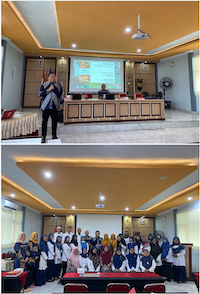 Bahasa Indonesia
Bahasa Indonesia English
English
You are here
ETHNOSCIENCE-BASED CHEMISTRY LEARNING FOR HIGH SCHOOL CHEMISTRY TEACHERS

Community Service is one of the tridharma of higher education which must be implemented every year by lecturers. In 2023, several lecturers as a service team from the Chemistry Education Study Program, Department of Chemistry Education, Yogyakarta State University, will carry out Assistance for the Development of Ethnoscience-Based Chemistry Learning. This activity was carried out by Prof. Dr. Antuni WIyarsi, Drs. Heru Pratomo Al., M.Sc., Nur Fitriyana, M.Pd., Metridewi Primastuti, M.Pd, and Dra. Lis Permana Sari, M.Si. The service team also collaborates with the Indonesian-Yogyakarta Chemical Association, by inviting Prof. Dr. Harno D Pranowo from Gadjah Mada University, as guest speaker.
In the auditorium of SMA Negeri 2 Bantul on August 2 2023, participants and a team of service lecturers will discuss material about (1) basic concepts of ethnoscience-based chemistry learning, (2) examples of ethnoscience-based chemistry learning, (3) ethnoscience-based evaluation, and (4 ) ethnoscience-based media. All of this material was successfully understood by the training participants. This is demonstrated by the enthusiasm of the training participants in identifying Yogyakarta cultural traditions that are relevant to be studied in chemistry learning with students. The follow-up actions carried out by the participants included looking for colleagues as collaborators to discuss ethnoscience-based chemistry learning ideas so that the results of the training could be implemented more optimally. The results of this discussion produced several ideas about chemistry learning that integrates ethnoscience as a chemistry learning context, including:
The identity of Yogyakarta coffee, namely joss coffee, a mixture of black coffee and charcoal, has the potential to explain its health benefits through the concept of adsorption.
Jamasan pusakan, as a tradition of bathing or washing heirloom objects, especially in the Yogyakarta Palace, has the potential to be studied using the chemical concept of metal oxidation.
The culture of batik painting for some craftsmen is a study of local wisdom which has the potential to help develop the concept of environmentally friendly dyeing chemistry. The development of this coloring can be studied through various chemical concepts such as acid base and pH.
Through this mentoring activity, participants' insight into ethnoscience-based chemistry learning has developed. It is hoped that from the results of this training, high school chemistry teachers in Bantul Regency can apply ethnoscience-based chemistry learning in their daily chemistry teaching activities so that they can contribute to overcoming the problem of low student motivation and chemical literacy.
Sistem Informasi
Kontak Kami
Program Studi Pendidikan Kimia
FMIPA Universitas Negeri Yogyakarta
Gedung Dekanat D.07 FMIPA UNY
Kampus Karangmalang Yogyakarta 55281
Telp. (0274)586168 Pes. 115
Email: pend_kimia@uny.ac.id
Copyright © 2026,
